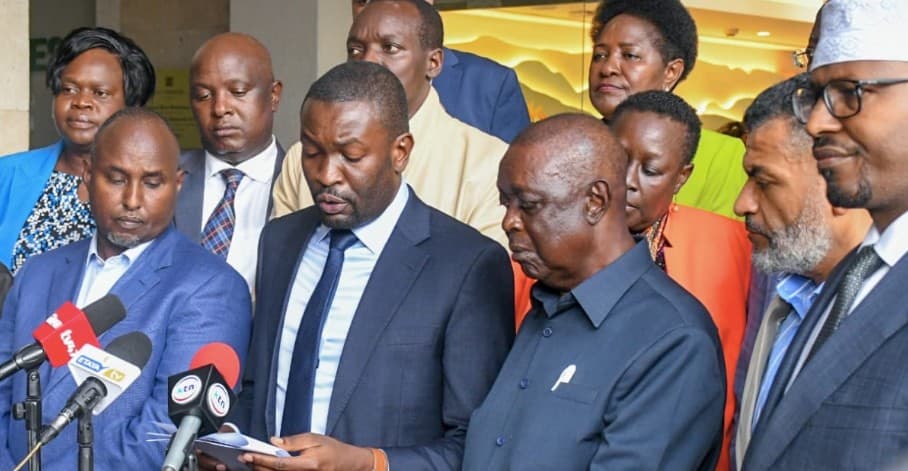We're loading the full news article for you. This includes the article content, images, author information, and related articles.
Calls to eject Secretary-General Edwin Sifuna over his opposition to the government pact have ignited a fierce battle for the party's soul, forcing a critical choice between honouring Raila Odinga's legacy as a national movement or retreating into a regional bloc.

NAIROBI, KENYA – In the delicate period following the death of its founder Raila Odinga on Wednesday, October 15, 2025, the Orange Democratic Movement (ODM) is confronting an existential crisis that pits party discipline against its foundational identity. A fierce internal struggle over the party's future direction has erupted into public view, centred on its outspoken Secretary-General, Nairobi Senator Edwin Sifuna. Calls from a faction of party leaders for his expulsion threaten to unravel Odinga's long-held vision of a national political movement, according to an opinion piece in the Daily Nation published on Thursday, October 30, 2025. The debate over Sifuna's fate has become a proxy war for the soul of ODM, with significant implications for Kenya's political landscape ahead of the 2027 General Election.
The controversy stems from deep divisions over ODM's continued participation in the 'broad-based government' arrangement with President William Ruto's Kenya Kwanza administration. Mr. Sifuna has been a vocal critic of the pact, arguing it has demobilised the party's opposition base and yoked it to an incompetent government. His public declarations that the deal was "dead" following alleged state-sponsored brutality and abductions have been branded by some senior party members as gross misconduct and a betrayal of the leadership's direction. This has led to public demands for his resignation or removal, with Homa Bay Town MP Peter Kaluma and Nandi Senator Samson Cherargei being among the most vocal proponents for disciplinary action.
However, Sifuna and his allies maintain their stance is a defence of ODM's core principles and aligns with what they interpret as Raila Odinga's final instructions: that the party must prepare to field its own presidential candidate in 2027. An opinion published in the Daily Nation on October 30, 2025, argued that ejecting Sifuna for this position would directly undermine Raila's legacy, reducing a national outfit into a regional entity. Political analysts have echoed this concern, noting that Sifuna's hardline stance resonates with a significant portion of the party's traditional base who feel ideologically alienated by the cooperation with President Ruto.
In a decisive move to quell the growing dissent, ODM's new acting party leader, Dr. Oburu Oginga, has publicly dismissed any possibility of Sifuna's expulsion. Speaking to a local TV station on Tuesday, October 28, 2025, Oginga, who is Raila Odinga's elder brother, affirmed that the Secretary-General remains a crucial pillar of the party. "As a young person, sometimes he can become restless and go a little overboard, but he is with us, and he will stay with us," Oginga stated, as reported by multiple media outlets on October 29, 2025. He confirmed that any disciplinary issues would be handled internally, effectively shielding Sifuna from his detractors.
This move came just a day after the ODM Central Committee, in a meeting chaired by Oginga, formally reaffirmed its commitment to the broad-based government until 2027. In a statement read by Sifuna himself on Monday, October 27, 2025, the party framed the decision as necessary to uphold Raila's legacy of seeking peace and national stability. This created a seemingly contradictory scenario where the chief critic of the pact was tasked with announcing its continuation, a move some analysts see as a strategic attempt to project unity amidst deep ideological fissures.
The internal power struggle within Kenya's largest opposition party has profound implications beyond its headquarters at Chungwa House. A fractured ODM would significantly weaken the country's opposition, potentially altering the balance of power and reducing governmental accountability. Political analyst Barrack Muluka warned on October 27, 2025, of a crisis that could threaten ODM's very existence, noting a lack of genuineness among some leaders discussing its future. The party's ability to navigate this transition will determine its relevance in the post-Raila era and shape the political alliances forming ahead of 2027.
For the Kenyan public, the outcome of this struggle could impact the nature of political competition and governance. ODM's historical role has been to champion constitutional reforms, devolution, and social justice. A retreat from its oppositional stance or a split into factions could diminish the institutional checks on the ruling administration. Following Raila's death, Sifuna himself pledged to do everything in his power to keep the party united, even in the face of "provocation." The coming months, leading up to the party's 20th-anniversary celebrations in November 2025, will be a critical test of whether ODM's leadership can unify around a coherent vision that honours its founder's complex legacy of both protest and statesmanship.
Keep the conversation in one place—threads here stay linked to the story and in the forums.
Sign in to start a discussion
Start a conversation about this story and keep it linked here.
Other hot threads
E-sports and Gaming Community in Kenya
Active 9 months ago
The Role of Technology in Modern Agriculture (AgriTech)
Active 9 months ago
Popular Recreational Activities Across Counties
Active 9 months ago
Investing in Youth Sports Development Programs
Active 9 months ago
Key figures and persons of interest featured in this article